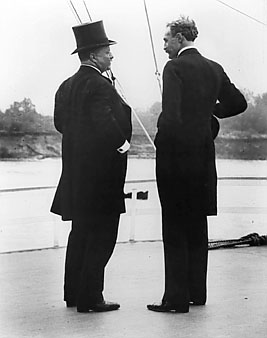On the order of Interior Secretary
Walter Fischer, Commissioner Dennett of the
General Land Office (GLO), dismissed the claims by Clarence Cunningham to coal fields within the
Chugach National Forest in Alaksa near the Bering River. The action by the Interior Department comes after a
scandal that led to the dismissal of the head of the Forest Service,
Gifford Pinchot, and more recently, after an intensive congressional investigation, the resignation of Fischer's predecessor,
Richard Ballinger. According to the extensive Washington Times article, the decision is seen as a vindication for Pinchot and several members of the Interior Department including:
Louis Glavis, who first brought attention to the possible illegality of the Cunningham claim; Overton Price, Pinchot's assistant, and Alexander Shaw.
In 1909, shortly after Taft took office, Louis Glavis sought the attention of Foresters Pinchot and Price regarding the Cunningham claims. During his tenure as an investigator with the General Land Office, Glavis determined that claims, thirty-three in total, had already been combined and optioned to Daniel Guggenheim, a member of a rich, industrialist family, for the J. P. Morgan-Guggenheim "Alaska syndicate." Once patented, a $5,000,000 company would be formed to process the claim, of which half the stock would go to the Guggenheim for a measly $250,000. Stephen Birch, managing director of the Guggenheim interests in Alaska, told Congress last year that the claims were worth at least $500,000,000 and that additional claims in the Chugach National Forest could be worth billions.
However, such an arrangement, to combine individual claims even before patents are awarded, is illegal. That is exactly what Glavis telegraphed to Pinchot in early July 1909. Glavis also believed that then-Interior Secretary Ballinger was involved in the scheme, as he had previously favored trusts in water power cases while he was Commissioner of the GLO. Ballinger had replaced Roosevelt's interior secretary,
James Garfield, who had been seen as a friend to the conservation movement and the progressives in the Republican Party. After convincing Pinchot and Price of the claim's illegality, they urged Glavis to take his case directly to the President. He did so by giving Taft a 50-page report at the President's summer home in
Beverly, Ohio.
Shortly afterward, on September 23, 1909, Taft sent a letter to Secretary Ballinger to fire Glavis, implying that Glavis was vindictive, untruthful, and incompetent. Taft based his letter on a memo sent by Oscar Lawler, the assistant attorney general for the Interior Department, though it was reported that it was based on a letter from Attorney General
Wickersham, but his department's report was not submitted until December. While Taft wrote a letter to Pinchot that the matter would be dropped, Glavis in November 1909 wrote an article in Collier's Weekly about the situation in Alaska and D.C. titled, "The Whitewashing of Ballinger: Are the Guggenheims in Charge of the Department of the Interior?" The article led to the Senate investigation. Pinchot was later fired as well after he sent a letter to the late Senator
Jonathan Dolliver, praising Glavis as a "patriot" and a faithful public servant, and said that the president had been deceived. The letter was read into the Congressional Record. The letter was in violation of an Executive Order forbidding subordinates in a federal department from communicating with congressmen directly and not through a superior. Pinchot's lieutenants at the forest service, Price and Shaw, were dismissed shortly afterward, though not denounced, as Pinchot had been by the administration.
The situation came to a head during the joint congressional investigations last year. Glavis, despite intensive grilling by pro-administration Senators
Knute Nelson and
Elihu Root, was a strong witness, denouncing the actions by Ballinger and vindicating Pinchot and his subordinates. His testimony swayed public opinion away from the Interior Secretary. A stenographer working for Ballinger by the name of Kirby testified that Ballinger was in correspondence with representatives of the Guggenheim syndicate. He had also seen Lawler and Ballinger burn the notes that served as a basis for Lawler's report to the president on the coal claims and Glavis, which served as a basis for the President's letter firing Glavis.
The damning testimony (and brave testimony as it saw that young man get fired over it), and the fact that the Lawler memo to Taft was found by the committee, was enough to make it clear that Ballinger's tenure as Interior Secretary was untenable and after the end of the last congress, before the new Democrat-led House was seated, Ballinger resigned. Ballinger would have had to resign earlier, but the final reports (yes, reports as the Democrats and Progressive Republicans wrote one report, and the pro-administration congressmen another) have still not been published [
or have they], and it was expected that the new Democratic House would vote to release them.
To this point, the claimants had been waiting for the patents to begin working on the claim. Secretary Fischer's decision means that Cunningham can't get the patents and therefore he can not turn the lands over to Guggenheim. Fischer has also gone on to vacate nearly all the coal claims in Alaska, though Taft has stated that the Guggenheim's should get something for the millions they have invested in the territory. This is seen as a major victory for the conservation movement that has been spearheaded by former President Roosevelt. It should also be remembered that Pinchot was appointed to the new Forest Service by his close, personal friend, Theodore Roosevelt. It remains to be seen how much an effect this case will have on next year's Presidential race, particularly as it seems more and more likely that Roosevelt may challenge his successor.
Link:
Coal Claims in Alaska Lost by the Guggenheims [The Washington Times]
Link:
Congressional Investigation Final Report







